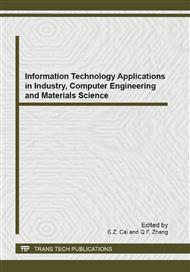p.2904
p.2912
p.2918
p.2922
p.2926
p.2932
p.2936
p.2940
p.2944
Quantum-Behaved Particle Swarm Optimization Algorithm for Solving Nonlinear Equations
Abstract:
A quantum-behaved particle swarm optimization algorithm is presented in this paper for solving nonlinear equations. The positions of particle are coded by probability amplitudes of qubits that are updated by quantum rotation gates in this method. The corresponding real number solution at specified interval can be extracted by this algorithm for solving nonlinear equations. Compared to real traditional method, the simulation results show that this algorithm is more accurate and effective.
Info:
Periodical:
Pages:
2926-2931
Citation:
Online since:
September 2013
Authors:
Price:
Сopyright:
© 2013 Trans Tech Publications Ltd. All Rights Reserved
Share:
Citation:


